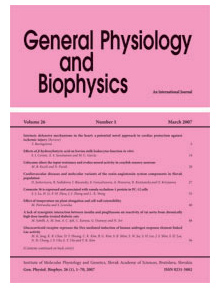Journal info
Aims and Scope |
||
Select Journal
Journals
Bratislava Medical Journal Endocrine Regulations General Physiology and Biophysics 2024 2023 2022 2021 2020 2019 2018 2017 2016 2015 2014 2013 2012 2011 2010 2009 2008 2007 Neoplasma Acta Virologica Studia Psychologica Cardiology Letters Psychológia a patopsych. dieťaťa Kovove Materialy-Metallic Materials Slovenská hudbaWebshop Cart
Your Cart is currently empty.
Info: Your browser does not accept cookies. To put products into your cart and purchase them you need to enable cookies.
General Physiology and Biophysics Vol.41, No.3, p. 221–230, 2022 |
||
| Title: Omentin-1 attenuates inflammation and barrier damage in DSS-induced ulcerative colitis in mice by inhibiting endoplasmic reticulum stress | ||
| Author: Lizhuan Ma, Xiujing Zhang, Chao Zhang, Yanli Zhou, Hongliang Zhang | ||
| Abstract: Ulcerative colitis (UC) is a diffuse inflammatory disease that occurs in the mucosa of the colon and rectum. Research illustrated that omentin-1 level was significantly lower in the serum of patients with UC. This study systematically examines the emerging roles of omentin-1 in UC and its related mechanisms. Omentin-1 level in dextran sulfate sodium (DSS)-induced mice was examined by Western blot and RT-PCR. The expressions of endoplasmic reticulum (ER) stress-related proteins were detected adopting Western blot with or without the addition of ER stress inducer tunicamycin (TM) in colitis mice. Subsequently, in DSS-induced UC mice, colonic damage was determined by H&E staining, body weight, colon length, and disease activity index (DAI). Inflammation and barrier damage were examined by ELISA and Western blot. Cell apoptosis in colon tissues was examined by TUNEL and Western blot. Omentin-1 expressed lowly in DSS-induced colon tissues of UC mice, and its overexpression inhibited ER stress. Additionally, overexpression of omentin-1 also inhibited DSS-induced colon damage, inflammation, barrier damage and cell apoptosis in UC mice; however, these changes were partly abolished by TM administration. In conclusion, omentin-1 attenuates DSS-induced inflammation and barrier damage in UC mice by inhibiting ER stress, suggesting omentin-1 may be a useful target for the treatment of UC. |
||
| Keywords: Omentin-1 — Ulcerative colitis — Inflammation — Endoplasmic reticulum stress — Barrier damage | ||
| Published online: 23-May-2022 | ||
| Year: 2022, Volume: 41, Issue: 3 | Page From: 221, Page To: 230 | |
| doi:10.4149/gpb_2022012 |
||
|
|
 download file download file |
|

